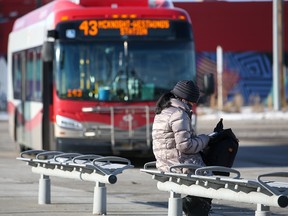The city hopes to borrow up to $168 million from the federal government’s Canada Infrastructure Bank

Article content
The city appears to be close to a deal with the federal government on a low-interest loan to buy electric buses for the city’s transit fleet.
Advertisement 2
Article content
A report going to the council’s executive committee on Wednesday provides more details on what the investment in up to 259 electric buses to replace end-of-life diesel buses could mean for the city’s CO2 emissions.
Article content
The city hopes to borrow up to $168 million from the federal government’s Canada Infrastructure Bank. This transaction must be done before the end of 2022, otherwise the city runs the risk of higher interest rates.
Mayor Jyoti Gondek called the matter a “timely item” at Wednesday’s meeting.
“Those decisions have not yet been taken by the federal government, but we must indicate that we are willing to receive the funds because we have also made an investment,” said the mayor.
The city budgeted $100 million in municipal funds for the purchase of the new buses, including $80 million in approved capital funding from the recent budget and another $20 million from the city’s centralized climate fund.
Advertisement 3
Article content
It is also seeking grants of up to $223 million from the federal government’s Zero Emission Transit Fund.
The report the committee will receive Wednesday has answers to questions councilors have previously asked about what it will mean for Calgary’s carbon footprint. The city expects that the purchase of the electric buses will directly reduce the total CO2 emissions of the bus fleet by 13,000 tons of CO2.
This is equivalent to removing around 5,650 vehicles from the road.
The fleet currently emits just over 60,000 tonnes of CO2 annually. This investment would bring that number to just under 50,000 tonnes each year.
-

Council committee all on board for proposed electric bus purchases
-

Transport fares are set to rise by 11 per cent in the four-year budget plan
-

Roam Transit expanding fleet of electric buses in partnership with Parks Canada
Long term, and continuing to replace the diesel fleet with other zero-emission buses, the city hopes to reduce its transit bus emissions to around 32,000 tonnes per year by 2030.
Advertisement 4
Article content
Continuing on its current trajectory without fleet electrification, the city’s bus fleet emissions were expected to approach 70,000 tonnes of CO2 per year by 2030.
Calgary is not first out of the gate with electric buses. The report details more than 20 municipalities that have operated at least one electric bus. One of the closest examples was Edmonton Transit Service, which purchased two 40-foot battery-electric buses in 2016.
According to Edmonton’s report after its pilot, the battery-electric buses performed “as reliably” as the diesel fleet. It found its buses operated efficiently in the winter months, but also used additional diesel heating.
Edmonton said battery-electric buses have a shorter range than diesel buses, and a larger fleet is needed to provide the same level of service.
Advertisement 5
Article content
Related
In a 2020 trial, Saskatoon added a single electric bus to its fleet. It found that the range of that bus varied from 175 kilometers to 361 kilometers, depending on the temperature. It also found that maintenance costs were significantly lower, at $9,000 a year compared to $43,000 a year for a diesel bus traveling the same distance.
That last figure could be important in winning the council’s approval for the plan. Calgary said the cost of borrowing from the federal infrastructure bank would be offset by the lower maintenance and operating fees associated with diesel buses.
Calgary currently has about 750 40-foot diesel buses, 90 60-foot diesel buses and 140 CNG buses, with 23 more on order.
brthomas@postmedia.com
Twitter: @brodie_thomas

